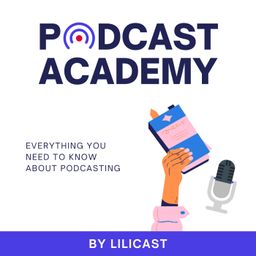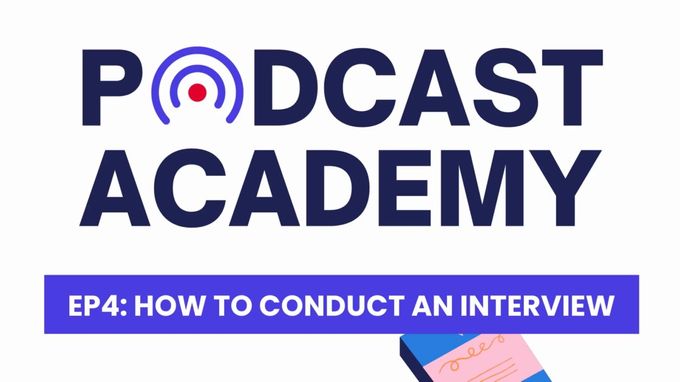
4 - How to conduct an interview

Chapters
























Description
(00:00:00) INTRO In this episode of the Podcast Academy, we are going to explain how to conduct an interview. Because clearly, there is a difference between questioning someone informally during a daily professional exchange and shooting precise questions that were prepared in advance at somebody. (00:00:20) First of all, we have to create a climate of trust with the interlocutors. During a first contact, whether by e-mail or by telephone, we clearly explain as to why we wish to talk to them. You can flatter them a little bit to convince them of your mission, by citing, for example, their achievements that impress you or their knowledge that interest you. People like to hear when being told that they are indispensable to a good and better understanding of the world... You can try to please your interlocutors but do not lie to them. If you want to obtain answers based on subjects that may be annoying, phrase it intelligently so that they do not get frightened, but also do not set a trap by questioning them by surprise. Give the interlocutors the opportunity to prepare their answers. It is better for them and for you! (00:01:11) If contact by email is easier, it is because you have plenty of time to prepare your argument, contact by telephone has its advantages: It allows you to check the temperature, listen to the way your interlocutor talks. Is the person talkative or not? Is the person frank or not? This enables you to adapt your questions accordingly. (00:01:36) PREPARING YOUR QUESTIONS Before the big day, I advise you to absorb all the information that will allow you to master the subject. Read, or at least leaf through the books written by your interlocutor, find out about their bio, browse through the press articles published about them, visit their social media networks... in short, just do the job. (00:01:56) Preparing your interview with care is as important as the interview itself. When we master our subject, we bounce back easily and with pertinence to the answers of the person, we are interviewing. This is how great and successful interviews are conducted. Because yes, know that a good interview is not only due to the interviewees and the answers that the interviewees formulate. The way we manage to extract information from somebody can also make an impression. So, we have to work on the topic before embarking... (00:02:36) WHAT MAKES A GOOD QUESTION? That's it, you have done your homework: Your questions are ready. But, uh, what is considered a good question? A good question is a question formulated in a clear and short manner. And it is a real question, with a question mark at the end. Some have the tendency to share a feeling in the hope of getting their interlocutor to react rather than asking a real question, with an adequate interrogative intonation. It can be annoying for those who have to answer: Since they do not know you, they may not get your point. Trust me, it can be a bit embarrassing to have someone say: Uh, excuse me, I have not understood your question. To sum up, if your questions are uninteresting, do not be surprised if the answers are uninteresting too. You can alternate between open and closed questions to create an interesting interview rhythm. Do not induce the answer into the question, however, you can formulate your questions in such a way so that you are able to slightly steer the conversation. (00:03:49) LISTEN TO THE INTERLOCUTOR To conduct a good interview, it is important to listen to the interlocutor. Yes, I know, it seems obvious, but when we are in the heat of the moment, we can be easily distracted and thinking of the next question already even though the person at the other end of the line or right in front of us, is still talking. As a result, we do not listen carefully, and completely lose track of what we were meant to say in the first place. The brain must be fully focused on the conversation in progress. In order to not pollute your mind and not lose the thread of the interview, let's go back to what I said earlier: So, we work on our topic, we prepare the questions carefully, we master the bio of the person in question; So, this will help us to relax, to be fully present and to listen actively. (00:04:42) A GAME BUT NOT BOXING Conducting an interview is like playing a game. But more like a tennis match rather than a boxing match. We do not attack but throw the ball back. However, a brutal winning setback should not be excluded. Do not ask complex questions straight away, take the time to layout your topic. Also, do not avoid questions that may be harsh, if there are any. Your audience may get the impression that you are not being honest and that you always agree with every point of view of your interlocutor. We are allowed to ask complicated or confusing questions but all while being respectful. Moreover, the interview can have several objectives. In some cases, it is important to showcase the interviewee; This is often the case where the interviewee has something to sell and the interview is being conducted for the promotion of that product or service., but it could also be in the form of a conversation. You give the floor to someone and you just react to it, in the form of a real exchange of views; and it can be more interesting if you have something relevant to add. (00:05:52) HOW TO MAKE YOUR GUEST TALK It is also possible that the person you are interviewing is not used to this kind of exchange. Some guests talk too much, feel flattered to be handed the microphone, and some say very little. This can be a problem in both cases. Do not forget that it is you who is leading the debate. However, do not let yourself be overwhelmed by the verve of your interlocutor. There is nothing more painful than a guest who monologues. Do not hesitate to interrupt if you feel that the interlocutor is going off track and re-initiate the topics that interest you. You have the right to politely insist to help him get back on track: Your call. (00:06:35) Encouraging a guest who is too shy or reluctant to talk is more complicated. If you keep the interview in questions-and-answers format, blanks and hesitations can be embarrassing. But an interview can be conducted in a different way other than in a question-and-answer format only. You can keep the answers that you find interesting and include them in a conversation that you will conduct in your own way by mentioning the main points about the topics you have chosen to address. We are not going to lie to you: It takes a lot more work to edit. Fortunately, Lilicast is user-friendly. (00:07:15) CONCLUSION Interviewing is a subtle art, and it can be wildly enjoyable once we master it. Take the time to work hard on your topic, you will only get more pleasure out of it.




